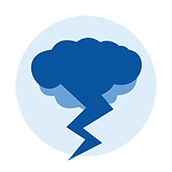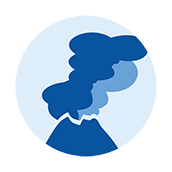What you can do to be ready for a tsunami
What you will find on here
What is a tsunami?
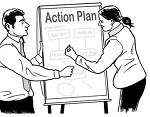
The information on this page is about what to do if a tsunami happens.
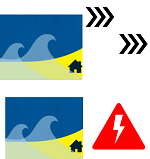
Tsunami are waves that can:
- travel very fast
- be very dangerous.
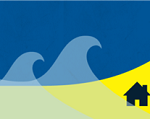
If an earthquake happens under the sea it can cause tsunami.
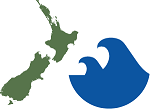
All of the coast of New Zealand is at risk of tsunami.
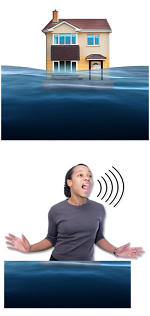
If a tsunami happens:
- it can cause a lot of damage
- it can put people in a lot of danger.
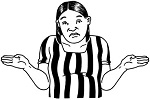
It is not possible to know when a tsunami might happen.
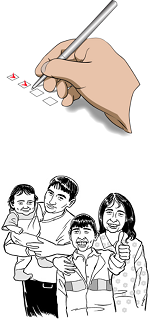
There are things we can do to:
- be ready if a tsunami happens
- protect ourselves
- protect our family / whānau.
Making a tsunami plan

The best way to get ready for a tsunami is to make a plan.
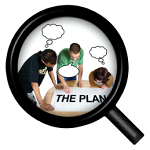
Having a plan will make it easier for you to know what to do if a tsunami happens.
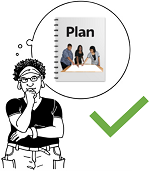
It is important to practise what you will do in a tsunami so you can act quickly to keep yourself safe if it happens.
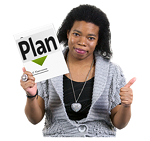
Practise is when you do something many times so that you can get good at doing it.
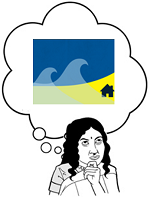
It is a good idea to find out what the tsunami risk is like where you live.

The tsunami risk will tell you how likely it is a tsunami will happen.
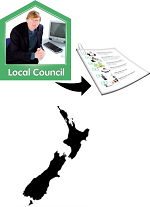
Your local Civil Defence Emergency Management Group can give you information on tsunami including:
- advice on what to do if a tsunami happens
- evacuation zone maps.

Evacuate means to get to a safe place away from danger.
You should know where these safe places are wherever you go.
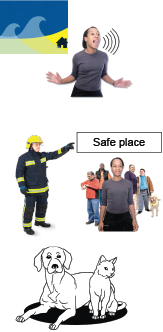
Your local Civil Defence Emergency Management Group should also be able to tell you:
- how they will let people know about a dangerous tsunami
- how they will evacuate people if a tsunami happens
- what you should do with any animals you own if a tsunami happens.
Things you can do to be ready for a tsunami
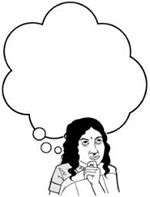
There are some things you can do to be ready for if a tsunami happens.

If you have house insurance you should make sure it is up to date.
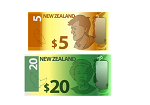
Having insurance is when you pay money to an insurance company so that they will assist you if something goes wrong.
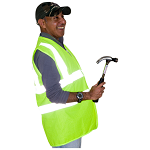
Having insurance will help you get things fixed sooner if your house is damaged by a tsunami.
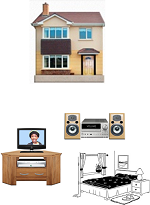
You should make sure you have insurance for:
- your home
- the things you have inside your home known as contents.
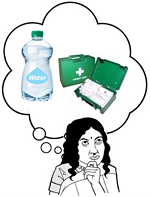
It is a good idea to think about what emergency supplies you might need.
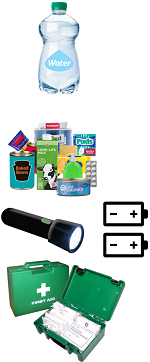
Supplies could be things like:
- a stock of bottled water / food for everyone in your house
- a torch with extra batteries
- a first aid kit.
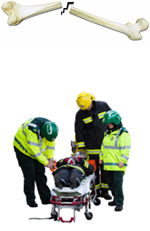
First aid is when you give medical help to someone who is injured so you can:
- save the life of that person
- prevent their injury from getting worse.
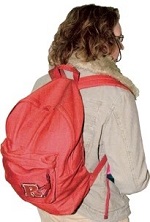
It is also a good idea to put together a grab bag that you can take with you in an emergency.
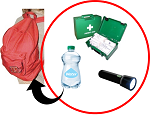
A grab bag is a small backpack of essential items that you can take with you if you need to get away from danger very quickly.
Tsunami evacuation zones

If you think a tsunami is going to happen there are some things you should do.
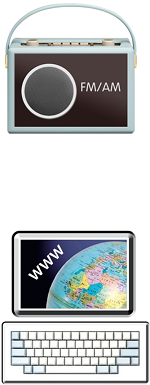
It is important to keep up with any information.
Places you might find information include:
- your local radio station
- groups on the internet such as your local Civil Defence Emergency Management Group.
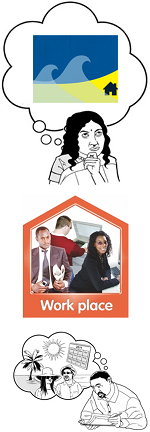
You should know where your tsunami evacuation zones are when you are:
- at home
- at work
- on holiday.
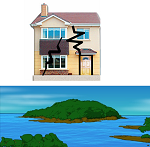
Tsunami evacuation zones are places on the coast / sea that are most likely to be badly affected by a tsunami.
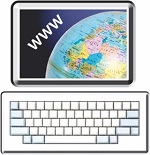
You can find tsunami evacuation zones on the Get Ready website at:
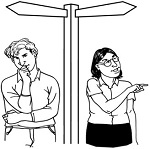
You should practise the route you will take to evacuate sometimes known as a tsunami hīkoi.

A tsunami hīkoi is a walk that takes you along your tsunami evacuation route and leads you:
- inland away from the coast
- towards high ground.

You should have your grab bag ready in case you need to evacuate.
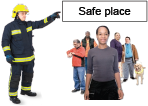
You should follow any orders that tell you to evacuate to stay safe.
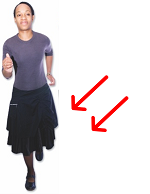
You should evacuate straight away if you do not feel safe even if you have not been told to.
Staying safe when you evacuate
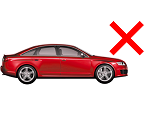
It is important to stay safe when you are evacuating.
Using a car to help you evacuate increases your chances of getting stuck in traffic.

If you can it is better to:
- walk
- run
- use a bicycle.

If you have to leave your home you should take your pets with you if it safe to do so.
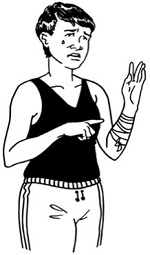
You should not do anything that will:
- slow you down
- put you in danger.

You should not go back to your home until you have been told it is safe to do so.
Tsunami warnings

Tsunami can happen so fast that there may not be time for a warning.
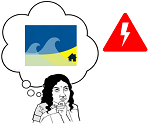
It is important that you know the warning signs so you can act quickly.

Natural warnings
Natural means things that we might be able see happening around us.

A tsunami is more likely to happen if an earthquake:
- is very strong
- lasts for a long time.
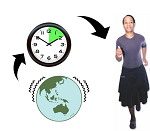
You should remember that if an earthquake is long or strong you should get gone.
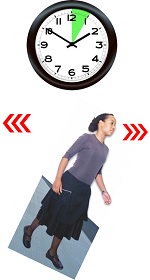
An earthquake is long or strong if:
- the shaking lasts longer than 1 minute
- the shaking makes it difficult for you to stay standing up.
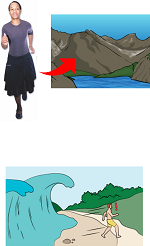
Get gone means that when the shaking has stopped you should move as quickly as you can to a high place
or
get as far away from the coast / sea as you can.
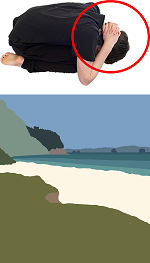
If you feel a long or strong earthquake when you are near the coast you should:
- drop cover and hold until the shaking stops
- move away from the coast / sea as soon as it is safe to do so.
You should get as high up as you can even if you cannot get fully out of your tsunami evacuation zone.
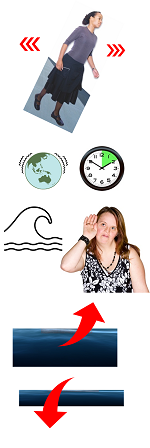
You should take action straight away if any of the following things happen while you are near the coast / sea:
- feel a strong earthquake that makes it hard to stand
- feel an earthquake that lasts for longer than 1 minute
- hear unusual noises such as a roaring sound coming from the sea
- see a sudden change in the sea such as the water level:
- rising
- falling.

Official warnings
If a tsunami comes from far away across the sea there is more time to warn people.
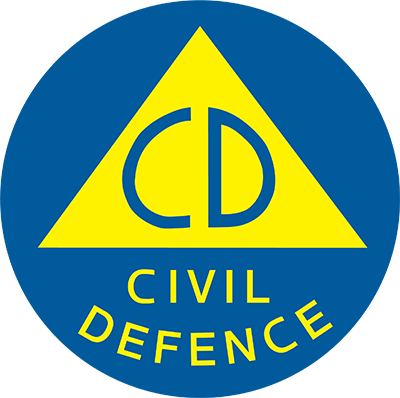
Civil Defence issues official tsunami warnings in New Zealand.
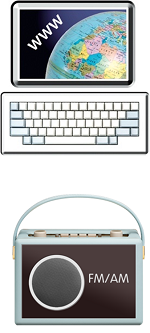
Tsunami warnings are published:
- online on the Civil Defence website at:
- on the radio
- on the television.
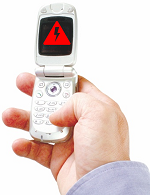
An Emergency Mobile Alert may also be sent out if there is a risk of a tsunami.
Emergency Mobile Alerts are messages about emergencies sent to some mobile phones.
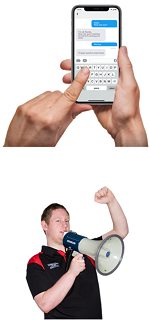
Tsunami warnings may also be sent out by:
- siren
- mobile text
- loud hailer
- other local arrangements.

You should ask your Civil Defence Emergency Management Group for more advice.
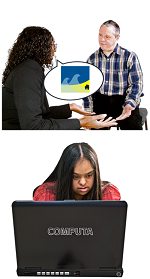
Unofficial warnings
It is possible you might get an unofficial warning about a tsunami.
Unofficial warnings could come from:
- friends
- members of the public
- media from overseas
- the internet.

If the warning seems trustworthy you should think about evacuating.

You should always trust an official warning over an unofficial warning.
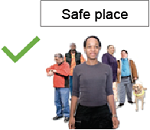
You can check how truthful the unofficial warning is:
- when you are in a safe place
- on the way to a safe place as long as it does not slow you down.
What to do after a tsunami

You should not go back to your home after a tsunami until you have been told it is safe.
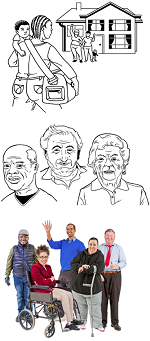
If it is safe you should check on people nearby who might need your help such as:
- your neighbours
- older / disabled whānau
- anyone else who might need your support.
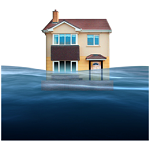
It is possible that a tsunami could damage your property.

Your property could be things like:
- the outside of your house
- things inside your house
- your car
- things in your garden such as sheds.
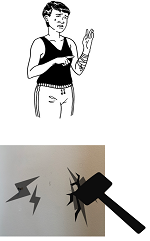
If your property is damaged by a tsunami you should not do anything that:
- could be dangerous to you
- could cause more damage to your property.
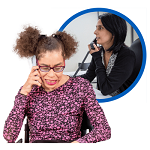
If you have insurance you should tell the insurance company about the damage the tsunami has done as soon as possible.

If you rent your home you should tell your landlord about the damage as soon as possible.

You should take photos of any damage caused by a tsunami.
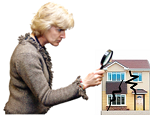
Having photos will mean that the insurance company can look at your insurance claim much faster.
What to do in an emergency
There are a lot of hazards in New Zealand. A hazard is something that can cause danger or put people at risk.



